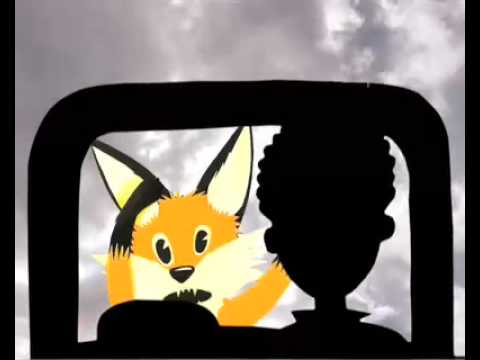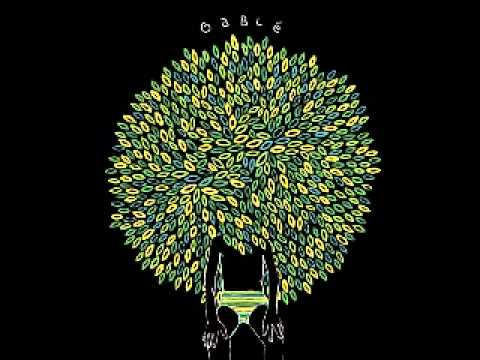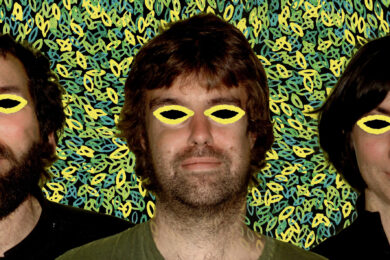"It’s difficult to answer questions one doesn’t ask oneself. Shouldn’t you inquire as to someone’s capacity to answer questions before questioning them?"
Just to clarify, I haven’t exactly been torturing Caen trio GaBLé to extract answers. I sent some questions via email, and a few days later I received ‘collective’ responses from the group. I have met them in the flesh; the first time was in the back of an old police van they had commandeered for touring purposes, with the three band members (Mathieu, Thomas and Gaëlle) huddled around my mic in the near-darkness, the air rich with the odour of the cheese they had brought over as a present for their label, UK-based Loaf. As perfectly accommodating as they were (and are), they were keen to deflate any attempts to over-explain their music, or to get them to contemplate it too deeply themselves. Focusing on the brevity of their songs – ‘album’ number two, I’m OK was actually considered an EP by the band but still contained 13 tracks – I wondered if they were generally quite impatient.
Thomas: "I am!"
Gaëlle: "I’m not."
Thomas: "Or maybe our ideas are not worth spending that much time on, perhaps nothing more would come of them if we gave them more time and more work. I think it’s just right the way it is."
It seemed almost excessively humble. Did Thomas suffer from a lack of self-confidence, I wondered?
Thomas: "Yes absolutely! I have no confidence in myself!"
I remind the band of this exchange from last time and ask them if they still feel the same. There’s a similar defensiveness but this time they do go a little further:
"We’d love to be able to add inconsistency to the list of Thomas’s failings (along with pessimism, pusillanimity and self-importance) but that still applies. Perhaps in there there is also a pretension to concision, thinking we can render something profound and complicated in a simple, obvious way."
Perhaps focusing on the length of GaBLé’s songs is the most banal observation one can make about their music, although it has certainly been a difficult feature to ignore since their 2008 debut, Seven Guitars With A Cloud of Milk. However, as with a lot of lo-fi – whether it’s early Pavement or Hype Williams – there’s a certain amount of ‘using’ inconsequentiality the way others might play with silence. Trying to visualise the songs on that first album – combining folk guitar and violin, hip-hop, doo-wop harmonies, electro blips, glitch beats and scratchy jazz samples, often with Thomas’s nervous-conversational vocals (delivered in an almost-but-not-quite-spot-on RP English accent (he has a French father and an English mother) to the fore – you might picture them as cranky contraptions of indeterminate function, assembled out of the bric-a-brac from a dusty farmhouse. Alone, some pieces are virtually inscrutable, almost junk. Together, though, they start to confer meaning on each other, with the most minor pieces of sonic detritus framing the comparatively more elaborate constructions like the standout, ‘Drunk Fox in London’ (which, as at least one commentator on this clip points out, resembles The Mighty Boosh’s Crack Fox!).
I’m OK may not have seen them stretching out their songs but there was a greater sense of groove and rhythm which the group attributed to the fact of working other musicians, like a live drummer, for the first time.
Now there’s CuTe HoRSe CuT, out this month. When I spoke to Gaëlle at the Trans Musicales festival in Rennes in December last year, she expressed trepidation about the record being too polished. The feeling was shared by Thomas and Mathieu, it seems:
"The further you go back, the more our records are chaotic and lo-fi. It’s what we know best, it’s what we start from. Over the course of our albums we’ve developed a certain know-how and a desire to enlarge the palette. Our approach since ‘Seven Guitars…’ has been, with Olivier (Lecce, who mixes the records), to try to develop the production side without losing the spontaneity of the writing and composition. On the last three albums, we have always had a moment or other when we’ve worried we’re making something too polished."
There’s no danger of that, even though CuTe HoRSe CuT is undoubtedly their most accomplished album to date (and some of the songs are a little longer than usual). On ‘Day’ they’re relatives of Super Furry Animals, and there are more moments of grace, such as the really rather blissful ‘Cyanure’. There’s also an even greater profusion of surrealistically picturesque details that, fortunately, is matched by superior spacial awareness – things are a bit more 3D this time, particularly the very visual ‘gags’ like the group of children that is sent screaming by a revving motor on ‘Bunch’. Given the sheer number of ideas on display, how much is left on the cutting-room floor?
"Right up to the last minute, the dolphins were looking like they were going to end up being disposed of by lumberjacks and the children would be packed off to join the Foreign Legion. Alas, they made the cut. All belt mechanisms, oviparous animals, marrows and close relatives were excluded. The assemblages don’t follows any rules and the there are plenty of off-cuts. Among them are some rather lovely things (tool + coin = fruit machine, sex + wind = pollinisation). The analogy with the visual domain is appropriate and is something that feeds into what we do a lot."
Meanwhile, on ‘0000’ (an album highlight), a hoover duets with an organ.
"Recordings take place in the living room-dining room area, just next to the kitchen," they explain. "It’s good for capturing the sounds of chewing and washing up, and the smell of fried chicken, friends passing by and vacuum cleaners. In the spaces between are carefully arranged guitars, keyboards, drum kit parts, bells, pedals, flutes, an accordion, a glockenspiel and cassette players. It all combines the convenience of a recording studio and the lack of convenience of a home. We’ve always proceeded this way and to do otherwise would be extremely unsettling."
All this eccentricity might be a bit much for some, which I suppose should make GaBLé a ‘love them or hate them’ group. I see GaBLé more as a ‘love them and hate them’ group, inspiring as they do wildly conflicting emotions in very short spaces of time, breaking from eye-watering tweeness into spasmodic violence or a trance-rock slipstream. Sometimes they have the same kind of effect on me as a John Peel fave from the post-punk era, …And The Native Hipsters’ ‘There Goes Concorde Again’, that same push-and-pull of irritation/fascination. I put it to them that this tension is actually one of the recurring themes in their songs – violence (and death, and ghosts) surface all over the place, warping or rupturing any surface pleasantness; bricks are thrown through windows; an awkward disagreement is "officially ended" by a blow to the jaw with a wrench; ‘Samba de la Muerte’ features the lines "I’ll hurt your elbow, I’ll kick your right shoulder, I’ll crush your blockhead, I’ll hit your left finger" and "I’ll cut your legs, you’ll stop dancing and simpering." (In these moments, GaBLé are pretty Beckettian.)
"Spot on, right on the money. Doesn’t everyone observe that and feel it around them? It’s what allows us to to not get bored, to surprise each other. Discomfort and dread keep us alert. Many of our songs combine contradictory ideas or moods, almost to a point where it’s become our formula! We’re going to have to find something less systematic…"
GaBLé are playing the Camden Crawl on 1 May. They’re rightly renowned for their live shows, which have included performances in prisons, as well as with choirs of children and elderly women.
"The old women (who weren’t all old and some of whom were men) seemed very numerous to us, the children beat us at football and the prisoners were granted pardons after having had to listen to us."
Yann Tambour was previously behind the frequently excellent post-rock of Encre and he’s still experimenting on his second album under this guise, Humbling Tides – just with a far more limited palette than he allowed himself in that previous incarnation. Specifically, Stranded Horse appears to be an attempt to master a particular instrument, the kora, on his own terms, while still taking cues from living masters like Malian player Ballaké Sissoko, who makes an appearance on ‘Shields’. He’s even built two ‘travel’ koras of his own to make touring easier.
Previously known as Thee, Stranded Horse, this time round Tambour has dropped the ‘Thee’ as well as the more markedly mannered vocal style he employed on his debut Churning Strides that was apparently under the influence of Marc Bolan; now, he’s closer to Nick Drake. Humbling Tides is about as spare an album as can be: mostly just Tambour’s still fey but more naturalistic voice, and kora. It’s one of those albums that paradoxically, in spite of its sonic sameness. Any track heard in isolation would give you a flavour of the album, but it only truly works when heard over its full length, and preferably many times over.
To begin with I wasn’t convinced I would have the patience for that, despite the immediately appealing sound of the kora, with each finger-picked, minor-key intro seeming to blend into the last, and a cover of The Smiths’ ‘What Difference Does It Make’ slotting all-too seamlessly into the whole. But even the second time around you start to notice the increasing space that opens up in the songs as the album progresses: the little rhythmic shifts and variations in patterns, and some more striking lyrical lines amidst the pastoral or pantheistic musings, like "staple your eyes to rusty bars" on 11-minute closer ‘Halos’ (which also has a comparatively frantic coda). Then there’s the presence on ‘Shields’ (with Sissoko) and ‘Le Blue Et L’Éther’ of Carla Pallone from Nantes folk duo Mansfield TYA, who is not only a perfect fit but, on this basis, one of the most distinctive violinists in the world of pop/rock/folk at the moment (who else – Warren Ellis, maybe?) – I think I could have picked out her playing even if I hadn’t been forewarned by the press release.
It’s difficult to see where Tambour will take the project from here; Humbling Tides ends up feeling like the pretty full expression of his particular vision. But that needn’t concern us for now; it’s a record that warrants, and amply repays, the close attention it asks for.
For more from Rockfort, you can visit the official site here and follow them on Twitter here. To get in touch with them, email info@rockfort.info.






